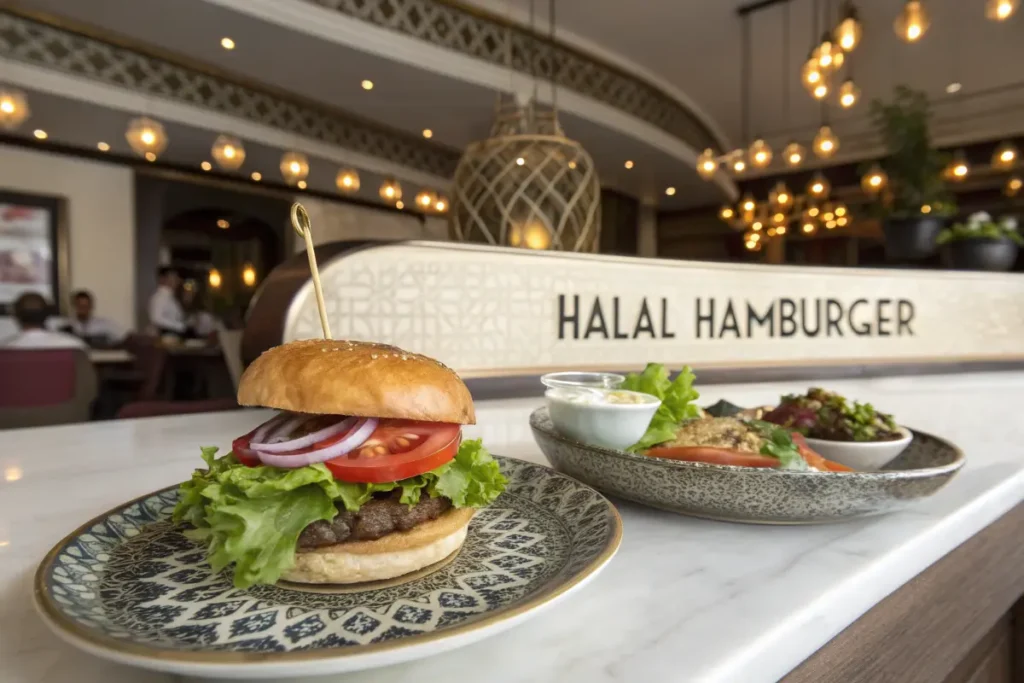Halal hamburgers have increasingly become a popular choice, especially in Muslim communities. Whether you’re enjoying them at a restaurant or preparing them at home, understanding what makes these hamburgers special is important. But what exactly makes a hamburger “halal”? Let’s explore what halal meat is and how it influences the preparation of halal hamburgers, making them a unique and significant part of many people’s diets.
What Makes a Hamburger “Halal”?
To define a halal hamburger, we must first understand halal meat. The concept of halal in Islam refers to anything permissible under Islamic law, especially when it comes to food. In the case of hamburgers, this means the meat used must come from an animal that is slaughtered in a manner consistent with Islamic principles. The process of preparing halal hamburgers ensures that they meet the dietary requirements of Muslims.
Halal meat doesn’t only refer to the way animals are slaughtered, but also encompasses the ethical treatment of animals and the absence of forbidden (haram) ingredients. These include substances like alcohol, pork, or any food additives that aren’t allowed under Islamic law.
Key Factors That Make a Hamburger Halal:
- Halal-certified meat: The animal must be slaughtered following Islamic guidelines.
- No pork or alcohol: There should be no pork or alcohol-based ingredients in the hamburger.
- Ethical sourcing: The animal must be treated ethically during its life.
Key Differences Between Halal and Non-Halal Hamburgers
At first glance, a halal hamburger might seem similar to a regular hamburger. However, the difference lies in the sourcing and preparation. While both may be served in similar forms, the meat used in non-halal hamburgers often doesn’t follow Islamic slaughtering practices. Non-halal hamburgers might also include ingredients prohibited by Islamic law, such as alcohol or pork-based products.
Halal vs. Non-Halal Hamburger:
- Meat Source: Halal meat comes from animals slaughtered in accordance with Islamic practices, whereas non-halal meat does not follow these guidelines.
- Ingredients: Non-halal burgers may contain prohibited ingredients such as alcohol or pork-based sauces.
- Cooking Process: Halal hamburgers are prepared separately to ensure no cross-contamination with non-halal foods.
Understanding Halal Meat
For a hamburger to be considered halal, the meat it contains must come from an animal slaughtered under Islamic guidelines. Halal meat must adhere to a very specific process, focusing on ethical treatment and religious observance.

Definition of Halal Meat
Halal meat comes from an animal that has been slaughtered in a way that ensures its purity and ethical treatment. A Muslim butcher must slaughter the animal, reciting a prayer (“Bismillah” meaning “In the name of Allah”) before the cut. This ensures that the meat is not only ethically sourced but also suitable for Muslim consumption. Additionally, halal slaughter requires draining the animal’s blood to maintain cleanliness and ensure the meat is halal-compliant.
Key Aspects of Halal Meat:
- Slaughtering Process: The animal must be slaughtered with the invocation of Allah’s name.
- Blood Drainage: All the blood must be drained from the animal to adhere to halal standards.
- Ethical Treatment: The animal must be treated humanely and with respect before and during the slaughtering process.
Certification and Standards for Halal Meat
Halal certification ensures the meat meets Islamic dietary laws. In many Muslim-majority regions, this certification is mandatory for meat to be considered halal. Various accredited organizations worldwide are responsible for certifying that meat and food products comply with these standards.
Halal Certification:
- Accredited bodies: Halal certification is provided by authorized agencies that verify compliance with Islamic law.
- Inspection: Regular inspections are conducted to maintain halal standards and avoid any contamination.
- International Standards: Different countries may have their own specific standards for halal certification, which must be adhered to by food producers.
In regions like the Middle East and Southeast Asia, halal certification is a vital aspect of food production and distribution. These regions have strict guidelines to ensure halal meat is available, and consumers can trust that their food is prepared according to Islamic practices.
Ethical Sourcing and Halal Practices
The ethical sourcing of halal meat is a crucial part of ensuring its compliance with Islamic principles. Islam emphasizes the humane treatment of animals. As such, the slaughter process must prioritize the well-being of the animal, ensuring it is killed quickly and without undue suffering. The proper methods of slaughtering animals are vital to maintaining the integrity of halal practices.
Halal meat production involves more than just following religious rituals; it is deeply rooted in ethical farming practices. Animals must be treated with care throughout their lives. For instance, they must have access to adequate food and water and be protected from harm. In addition, animals must not be mistreated or subjected to undue stress before slaughter. This approach contrasts with industrial farming methods, which sometimes prioritize efficiency over animal welfare.
The Role of Halal Certification in Ensuring Compliance
Halal certification plays a significant role in maintaining the integrity of halal food products, including hamburgers. Certifying bodies check the entire production process, from slaughtering to packaging, ensuring that all steps comply with Islamic laws. This certification also provides consumers with the assurance that their food is safe and ethically sourced.
Accredited halal certification bodies are present worldwide, providing strict guidelines that food producers must follow. These bodies carry out regular inspections to ensure compliance, and they also offer international standards recognized by Muslims across the globe. For instance, the Halal Food Standards Alliance of America (HFSAA) and the Dubai Islamic Affairs and Charitable Activities Department (IACAD) are widely recognized organizations for certifying halal food.

Ingredients of a Halal Hamburger
Halal hamburgers are not just about the meat itself; the entire burger must adhere to halal guidelines, from the buns to the sauces and toppings. It’s essential to consider every component of the hamburger to ensure it aligns with Islamic dietary laws. Let’s dive into the different ingredients and how they contribute to making a halal hamburger.
Types of Halal Meat Used in Hamburgers
While beef is the most popular meat choice for halal hamburgers, a variety of other meats can also be used. These meats must be sourced from animals that have been slaughtered according to halal practices, ensuring the meat is clean, ethical, and permissible for Muslim consumption. Whether you’re in the mood for something leaner or more robust, there’s a halal option to suit your taste.
Popular Halal Meat Choices:
- Beef: Known for its hearty and juicy texture, beef is the go-to choice for a classic hamburger. It’s flavorful, tender, and widely available in halal markets.
- Chicken: A leaner alternative to beef, chicken is often chosen for those who prefer poultry over red meat. It offers a milder taste and can be prepared in various ways.
- Lamb: With its unique, rich flavor, lamb is an excellent choice for those looking for a more luxurious and distinct taste in their burger.
- Turkey: As a leaner option, turkey is often used for healthier alternatives to traditional beef burgers. It offers a mild flavor that pairs well with various toppings.
Halal Buns and Sauces: A Closer Look
While the meat is the star of any burger, the buns and sauces play an essential role in completing the meal. For a hamburger to be fully halal, these components must also meet halal standards. Buns must be free from non-halal ingredients like lard or alcohol-based vinegar, and sauces should not contain any haram substances, such as alcohol or animal by-products. Fortunately, halal-certified options for buns, mayonnaise, ketchup, mustard, and other condiments are widely available.
Halal Buns & Sauces:
- Buns: The buns must be made without non-halal fats, preservatives, or emulsifiers that might contain animal by-products from non-halal sources.
- Sauces: When choosing sauces, it’s crucial to ensure that none contain alcohol, pork-derived products, or other forbidden ingredients. Many halal-certified condiments are now available in stores, such as ketchup, mustard, and mayonnaise.
- Cheese: Not all cheeses are halal, as some are made with animal rennet, which may not be permissible. Always look for cheeses labeled as halal, ensuring no non-halal enzymes are used in the production process.
Halal Hamburger Preparation Process
The preparation process of a halal hamburger is just as important as the ingredients used. It’s crucial to ensure that all components are halal-certified and that no cross-contamination occurs. This means using dedicated utensils, cooking equipment, and separate cooking areas to avoid any contact with non-halal foods. Let’s break down the essential steps in making a halal hamburger.
How Halal Hamburgers Are Made
To start, halal meat is carefully sourced and ground to create the patty. Spices and herbs that align with halal guidelines are then mixed in to season the meat. The patties are shaped, seasoned, and ready for cooking. The process doesn’t stop there; ensuring cleanliness in the cooking area and using separate grills or cooking pans to avoid contamination with non-halal items is vital to maintaining the integrity of the burger.
Steps in Halal Hamburger Preparation:
- Meat Sourcing: Always use halal-certified meat to ensure that the burger meets the dietary requirements of Muslims.
- Grinding and Seasoning: The meat is ground to the desired consistency and seasoned with spices and herbs, making sure all ingredients are halal-compliant.
- Cooking: Use a dedicated grill, frying pan, or baking tray to cook the patties. This helps prevent any accidental mixing with non-halal foods.
- Assembling: Once the patty is cooked, it’s placed on a halal-certified bun with fresh toppings like lettuce, tomatoes, and onions to complete the burger.
Cooking Methods for Halal Hamburgers
How you cook your halal hamburger depends on your preferences, but there are several ways to prepare the patty to achieve a delicious and juicy burger. Whether you prefer the smoky flavor from a grill or the tenderness of a pan-fried patty, the key is to ensure the meat is cooked thoroughly to guarantee its safety and flavor.
Common Cooking Methods:
- Grilling: Grilling is the most popular method for cooking halal hamburgers. It imparts a smoky, charred flavor to the meat and is perfect for outdoor cooking. Grilled burgers are juicy and flavorful, with a delicious crisp on the outside.
- Pan-frying: Ideal for those who prefer a quicker cooking process, pan-frying allows for better control of the burger’s doneness. A cast-iron skillet or non-stick pan works well for achieving a nice sear on the patty.
- Baking: For a healthier alternative, baking the patty in the oven helps retain moisture and reduces the use of oils or fats. This method is perfect for cooking multiple burgers at once and ensures a more even cook.
Ensuring Thorough Cooking
Regardless of the cooking method, it’s crucial to ensure that the meat is cooked thoroughly. This is especially important to avoid foodborne illnesses and to guarantee that the patty is juicy and tender. The internal temperature of the burger should reach at least 160°F (71°C) for ground beef or chicken to ensure it is fully cooked and safe to eat.

Health, Popularity, and Cultural Significance
Nutritional Value of Halal Hamburgers
When choosing a halal hamburger, many consumers are not only thinking about taste but also health. Halal meat is typically free from harmful additives, hormones, and antibiotics often found in non-halal meat. This makes halal hamburgers a cleaner, fresher, and often healthier option. Additionally, the ethical treatment of animals in halal slaughter practices contributes to the overall quality and nutritional value of the meat.
Health Benefits of Choosing Halal Meat
Opting for halal meat comes with several potential health advantages. Since halal meat must be processed in a specific, humane way, it is generally fresher and leaner. The absence of hormones and antibiotics that are sometimes present in non-halal meat can contribute to a cleaner eating experience.
Health Benefits:
- Cleaner Meat: Halal meat is free from added hormones, antibiotics, and artificial chemicals.
- Better Taste: Halal meat tends to be fresher and more flavorful due to fewer preservatives and chemicals used during processing.
- Ethical Standards: The humane treatment of animals and careful slaughter methods typically result in higher-quality meat that is more nutritious.
Comparing Nutritional Aspects of Halal vs. Non-Halal Hamburgers
While both halal and non-halal hamburgers can be high in calories and fat, halal burgers are often considered a healthier choice. Halal meat generally contains fewer preservatives and additives, which can contribute to a more natural flavor and a cleaner nutritional profile.
Halal vs. Non-Halal Nutritional Comparison:
- Additives: Halal hamburgers typically contain fewer preservatives and chemicals used in the production process, making them a more natural choice.
- Fat Content: Halal meats tend to have a healthier fat profile, often being leaner than their non-halal counterparts.
- Natural Flavor: Without the added processing chemicals, halal meat often has a richer, more authentic taste that appeals to many consumers.
FAQs Abou Halal Hamburger
What makes a hamburger halal?
A hamburger is halal when the meat used is slaughtered in accordance with Islamic guidelines, which prohibit pork, alcohol-based ingredients, and ensure the meat is properly drained of blood.
Is McDonald’s burger halal?
McDonald’s offers halal burgers in certain countries, such as the Middle East. However, their regular burgers in many regions may not be halal, so it’s best to check locally for halal certification.
Is Burger King halal for Muslims?
Burger King provides halal options in some locations, particularly in the Middle East. However, in other regions, their burgers may not meet halal standards, so it’s important to look for halal certification.
Is Texas Burger halal?
Texas Burger may offer halal options at specific locations, especially in Muslim-majority areas. It’s essential to check for halal certification at the restaurant to ensure the meat meets halal standards.
Is Chick-fil-A meat halal?
Chick-fil-A does not generally serve halal meat in the U.S., although they may offer halal options in some countries. Their regular menu typically doesn’t meet halal requirements, so it’s best to check.
Is Five Guys in America halal?
Five Guys does not offer halal-certified meat in the U.S. Their burgers and fries often contain non-halal ingredients, so Muslims should seek other halal-certified restaurants for their meals.
Why is Big Mac not halal?
The Big Mac is not halal because it contains non-halal ingredients, such as beef not slaughtered according to Islamic law, and sauces that may include alcohol or non-halal additives.
Conclusion
Halal hamburgers are more than just a meal; they represent a commitment to ethical eating and cultural significance. Whether you’re looking for a healthier option, adhering to dietary guidelines, or simply craving a delicious burger, halal hamburgers offer a flavorful and ethical alternative. With fresh, lean meat and a variety of halal-certified ingredients, these burgers provide a clean and satisfying dining experience. As halal food continues to grow in popularity, it’s essential to explore the many delicious options available. You can also check out recipes like Chicken and Peppers Recipe or learn more about Marry Me Chicken Pasta Recipe for more meal inspiration.
Next time you’re craving a burger, why not choose a halal one? Whether at your favorite restaurant or homemade, halal hamburgers are a tasty way to support ethical practices while enjoying a hearty meal. You can explore more on Tasty Wings & Seafood for additional options! So, why wait? Dive into the world of halal hamburgers, and experience the difference today!
Let us know your favorite halal burger spots, and share your thoughts with us in the comments!

